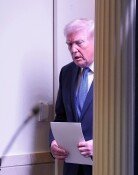[Editorial] Welfare State Ambitions
[Editorial] Welfare State Ambitions
Posted September. 19, 2006 06:54,
In Sweden, the rightist coalition won the victory over the ruling leftist coalition. The public chose an efficient and modest reform policy over welfare policy without proper alternatives. This is the transformation of a European nation following Germany where pro-business Angela Merkel, sworn in last September, has injected vigor into the economy. The Roh Moo-hyun administrations advocating the Swedish welfare system, a model that many countries are abandoning.
The Scandinavian country was a poster child of the welfare state, but reality was not like that. Since 1950, there was not an increase in jobs in the private sector. As the government gave jobs to excessive numbers of jobless people with taxes, as much as 30 percent of employment in the nation was in the public sector. The official unemployment rate was six percent, but it soared to 15 to 17 percent, taking into consideration vocational trainees, early retirees, and those on long-term sick leave, all of whom were excluded in the official statistics.
Prime Minister Goran Persson of the leftist coalition who took power over the last decade tightened regulations and levied heavy taxes on businesses. The governments unemployment benefits were as much as 80 percent of the salary on payroll. The big government, big welfare seems ideal but cant last long. The left Social Democratic Party was in power for 65 years since 1932 (out of power only for nine years), implementing welfare policies, which gave the nation bad name of Volvo without wheels. This is the very welfare model and state that President Roh, Uri Party Chairman Kim Geun-tae and others are trying to emulate.
Minister of Finance and Economy Kwon O-kyu highly praised the Swedish welfare model in a report titled Swedish welfare model and its implications last December, while he was an ambassador to the OECD, and the report claimed, The model brought about the virtuous cycle of welfare and growth. He stated that Korea should study the model and expand welfare services to the general public. Chairman Kim also often said Korea should emulate big government in the Netherlands and Sweden, rather than small government in the U.S. Chief Secretary to the President for the National Policy Lee Jung-woo once said, In Sweden, 30 percent of people are working in the public sector while in Korea, only five percent.
President Roh has been busy collecting taxes under the name of welfare state. It is the Roh administration that has tried to learn big government and welfare disease, instead of public transparency and culture for compromise between labor and management. Amid these, economic competitiveness has worsened and income gap has widened, which made the working Koreans lead their lives in harsh reality.







